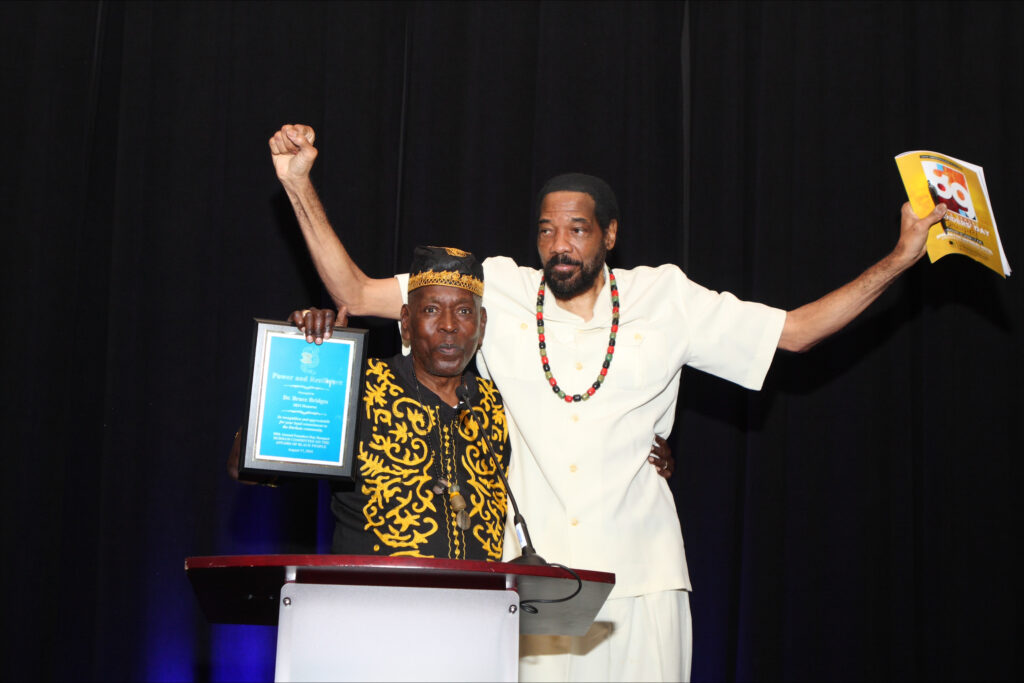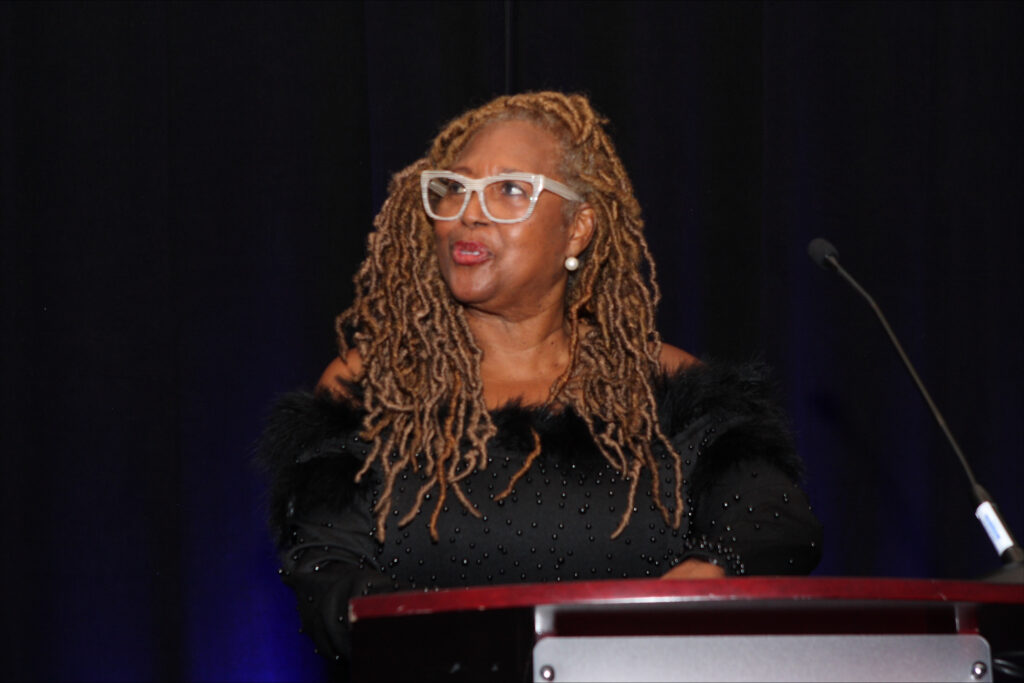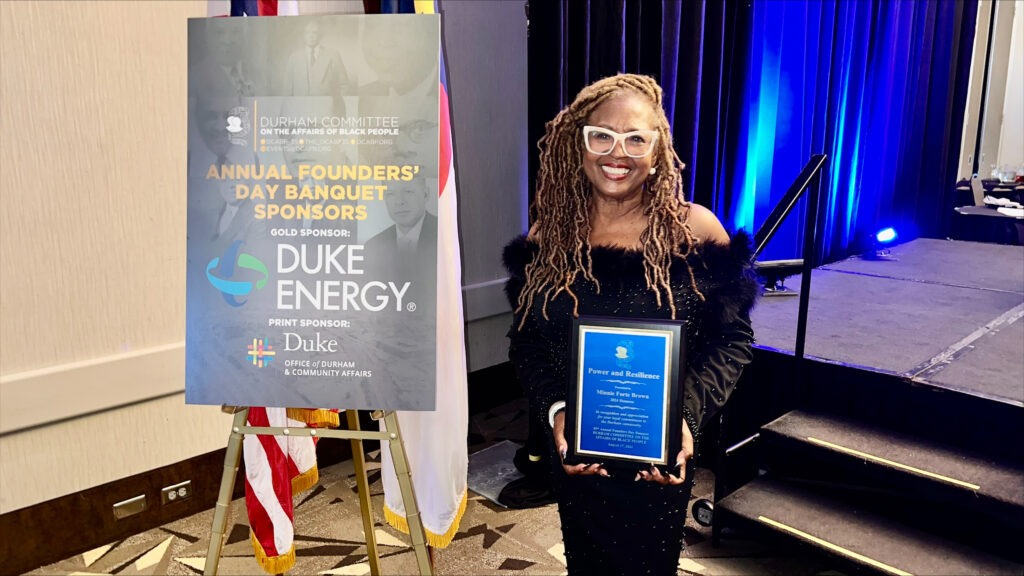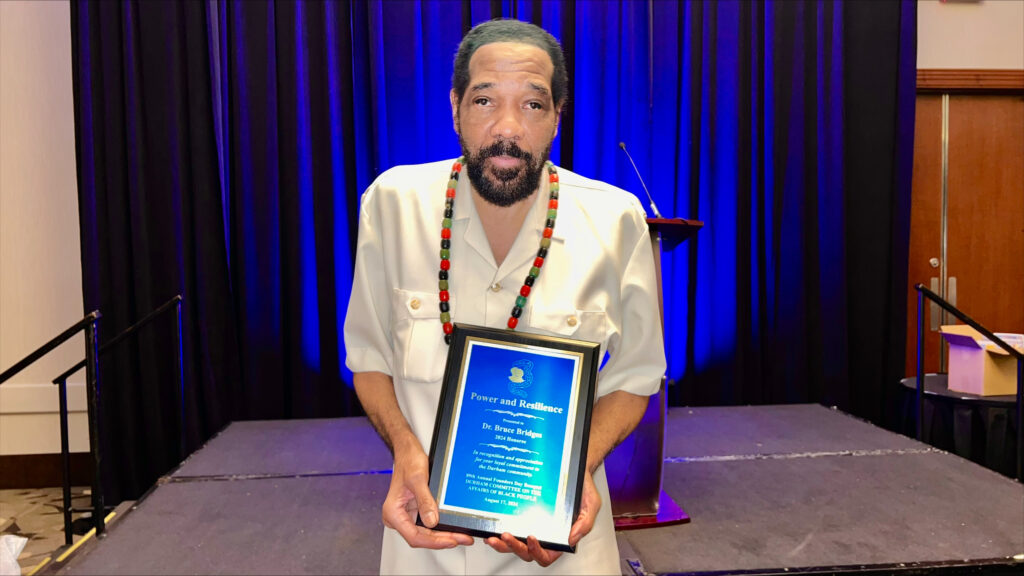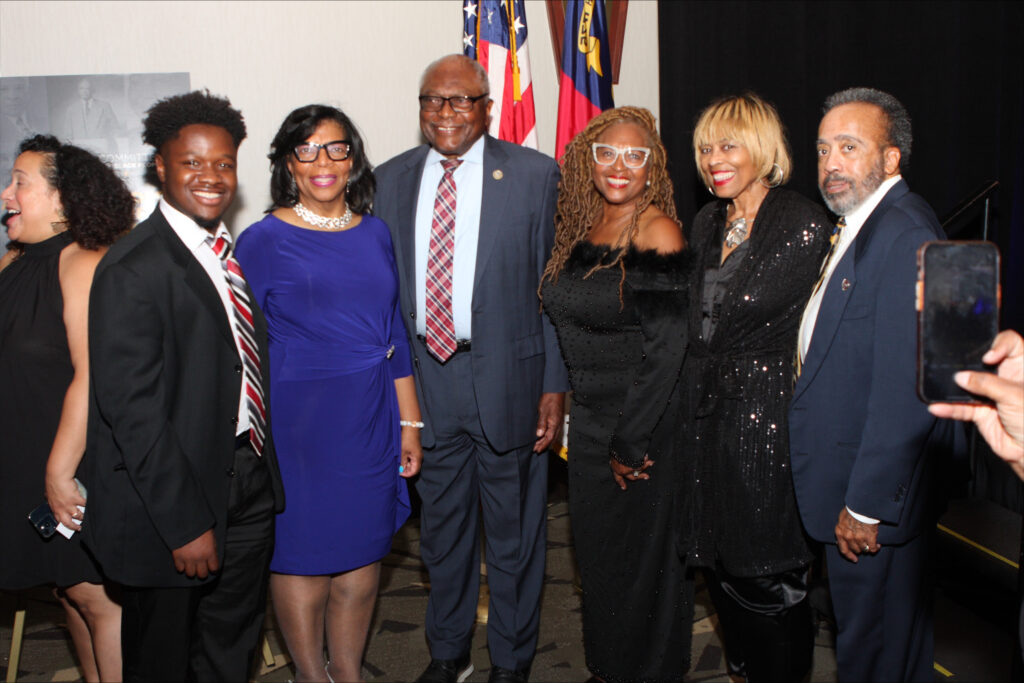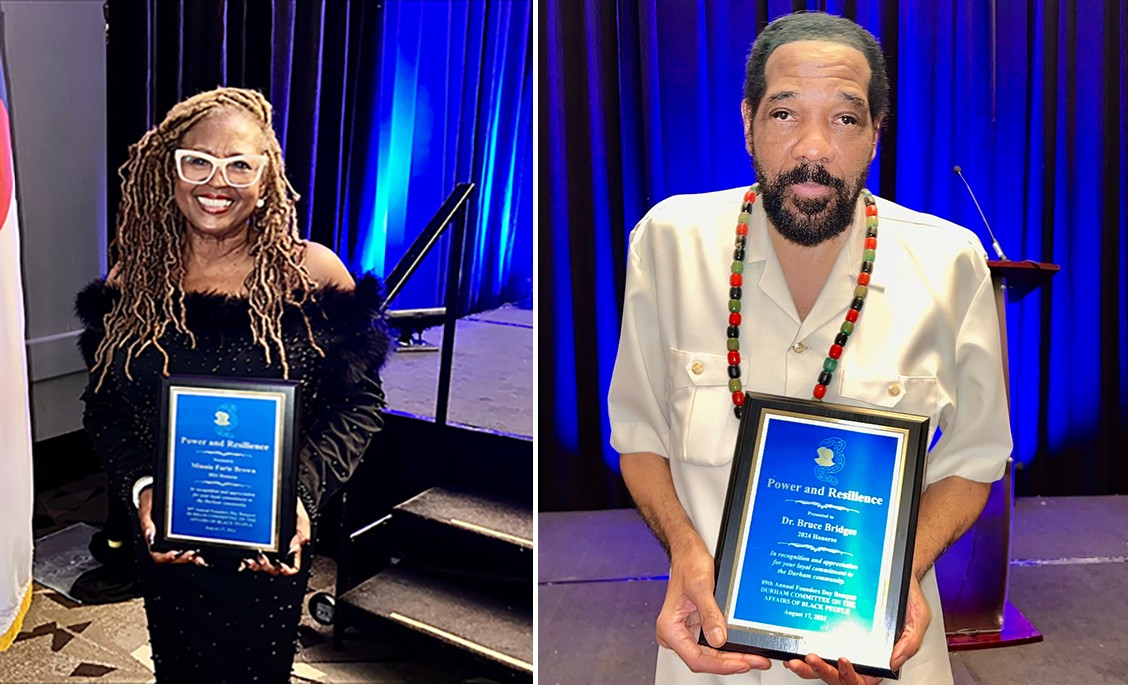
Falcons Soar in Local Event
The Saint Augustine’s University (SAU) Falcons alumni base consists of about 11,000 alums worldwide and regularly win honors and accolades. An example was the 89th annual Founders’ Day Banquet of the Durham Committee on the Affairs of Black People, held Aug. 17 in Durham, NC.
More than 600 attended the prestigious event at the Sheraton Imperial Hotel. The keynote speaker was Representative James E. Clyburn, a Democratic Congressman from South Carolina and one of the most influential members of Congress. However, two Durham residents with ties to SAU—alumna Minnie Forte-Brown, ’72, and former professor Dr. Bruce Bridges—received much of the spotlight.
Ms. Forte-Brown graduated from Saint Augustine’s College (now University) in 1972. Dr. Bridges taught at SAU in the 1980s, in what was then known as the Department of History and Government.
The Durham Committee on the Affairs of Black People dates back to 1935 and whose mission is to “promote the welfare of Black people in civic, cultural, economic, educational, health, housing, political, youth, and religious and human affairs.” The group stated in its program that Ms. Forte-Brown and Dr. Bridges have led “lives of service [that] exemplify the founding vision of the Committee.”
The program stated about Ms. Forte-Brown: “As a Durham Public School Board member for 16 years and developer of the Durham Children’s Initiative, Ms. Forte-Brown has worked tirelessly to improve access to education. Her selfless commitment to this mission is admirable and will leave a lasting mark on our community.”
Regarding Dr. Bridges, the Committee stated: “Dr. Bruce Bridges has also been a pillar in the Durham community throughout his life. A Durham Native and North Carolina Central University alumnus, Dr. Bridges is an esteemed history professor at NCCU and Saint Augustine’s College. A remarkable author, exceptional speaker, and brilliant professor, he has made it his life’s mission to make change through his words, touching the hearts of countless people globally.”
Ms. Forte-Brown is a retired communications specialist and master teacher, formerly in the Department of English and Mass Communications at North Carolina Central University. She has received numerous awards for teaching excellence and community service and is a frequent presenter locally and statewide.
A Durham native who grew up in segregated schools, Ms. Forte-Brown, is nationally recognized for public school advocacy and board of education leadership. Her extensive resume includes president of the NC School Boards Association, National School Boards Association officers, and the Council of Urban Boards of Education, as well as university professor and other management roles.
Ms. Forte-Brown was elected to the Durham Public Schools Board of Education in 2004 and was a member, vice-chair, and chairperson until 2020. During her career, she taught at NC Central University.
Her statewide experience includes Governor Bev Perdue’s appointment to the NC Council of the Status of Women and the NC Gang Advisory Task Force. SNC is a co-founder of the East Durham Children’s Initiative (now Durham Children’s Initiative) and former chair of the Homeless Services Advisory Committee.
In 2021, the Durham Public Schools Board of Education unanimously voted to rename the Durham County Board of Education’s Staff Development Center in her honor.
Ms. Forte-Brown majored in speech and English at Saint Augustine’s. Her career goal was to be a speech pathologist; however, that major did not exist at Saint Augustine’s, so she had to take many of her courses at Shaw University.
She credits Saint Augustine’s crucial role in her personal and professional development. “Saint Augustine’s was great,” she said. “I still have close friends from there. I grew up at Saint Augustine’s. Saint Augustine’s nurtured me.”
Ms. Forte-Brown said that the university’s small size was important. She recalls that she was weak in science, but teachers took a personal interest in her and helped her succeed. “I shouldn’t have been good in science, but I had a nun as a biology teacher – I don’t remember her name, but she was an excellent teacher. I soared in science.”
Ms. Forte-Brown also recalls that the university chaplain – whose name she does remember, Father Clyde Beatty – was an anchor for her and other students as they navigated a transformative part of their lives. “We got into so many good discussions,” she said.
She said she learned her much-honored teaching style from Saint Augustine’s: “That’s exactly how I received teaching at Saint Augustine’s…It will be challenging, but it doesn’t have to be painful.”
Dr. Bridges is a native of Durham, NC. He and his six siblings lived in the McDougald Terrace community. As an elementary student at Burton School, he often visited the school library and the Stanford Warren Branch Library in his neighborhood. There, he developed an early love for reading, which is still with him today.
He attended the all-African American J.H. Whitted Junior High School, but due to integration, Dr. Bridges went to Durham High School, where he graduated. As a participant in the Operation Breakthrough student job program, he received an interview with Howard Fuller. This interview not only resulted in a maintenance position at The Scarborough Nursery School, but it was also a “conscience-raising” meeting for Bruce Bridges. He often discusses how Fuller exposed him to the contradictions of capitalism and racism in the American system. The meeting inspired him to join the boycott against the Durham Merchants Association. He regularly attended sessions with the Durham Committee on the Affairs of Black People, The United Organization for Community Improvement, and the Sunday night weekly solidarity meeting. Dr. Bridges read an original poem about the African-American experience at most Sunday night programs.
Dr. Bridges had no intention to continue in the arena of education. Benjamin Ruffin changed all of that. Bridges tells the story of how furious and disappointed Ruffin was when Ruffin asked him what he would do after high school. Bridges said, “I am going to find a job.” Ruffin jumped up from behind his desk in the UOCI office and said to Bridges that he had all his life to work. He then suggested to Bridges to “enroll at North Carolina Central University.” As a student at NCCU Bridges continued to be active on campus and in the community of Durham. He consumed the works of Stokely Carmichael, H. Rap Brown, Angela Davis, and other Black revolutionaries. While a student at NCCU, Dr. Bridges was invited to the local Muslim Mosque. After hearing Elijah Muhammad’s teachings, he organized fellow students to visit the Mosque. He was known to suggest that fraternities and sororities have their members attend the Mosque as a part of their initiation. Dr. DBridges won a free trip to Chicago to hear Elijah Muhammad in person for introducing many students to local Mosque #34.
He received a graduate scholarship to the University of Cincinnati. Upon his return he became a faculty member at NCCU. Many of his students were so inspired by the knowledge gained in his classes that they urged him to create a lecture series for the Durham community. The lecture series was created and became known as The Cultural Awareness Seminar. Lectures were conducted by Bridges every Thursday night in the student union of NCCU. The sessions were designed to last only during the summer while the space was available in the student union. Due to the growing interest Bridges moved the Cultural Awareness Seminar to St. Joseph AME church on Fayetteville Street. Several seminar students thought the knowledge they received was so necessary that more people in the Durham community should hear it. These students took it upon themselves to contact radio station WDUR and to have the Thursday night sessions as a part of the regular programming.
Dr. Bridges has lectured, conducted workshops and seminars on several college campuses, across America and the Caribbean. Civic organizations, family reunions, and even maximum-security prisons have invited him to speak. While on the faculty at Saint Augustine’s College, he was asked by the president of North Carolina State University to bring his knowledge and ability to that campus. He became the first person to ever teach African American Studies at North Carolina State University and was instrumental in the development of its African Studies curriculum and the Black Cultural Center on the campus.
Dr. Bridges said he came to Saint Augustine’s because of differing approaches to teaching that developed between himself and administrators at NNC Central. Dr. Bridges said NC became passionate about using his lessons in a meaningful way.
“I always applaud Saint Augustine’s because that was where I got started doing things the way I wanted to do them,” he said. “They let me teach courses centered on our people.”
Among the courses he taught at Saint Augustine’s was Introduction to African Civilization.
“Reverse the plight of less fortunate individuals – that has always been my focus,” he explained. “What good is it to have all this knowledge and all these degrees if you’re not able to help anybody?”
Dr. Bridges is also an entrepreneur; among his accomplishments is opening the first African American bookstore in Durham County.
